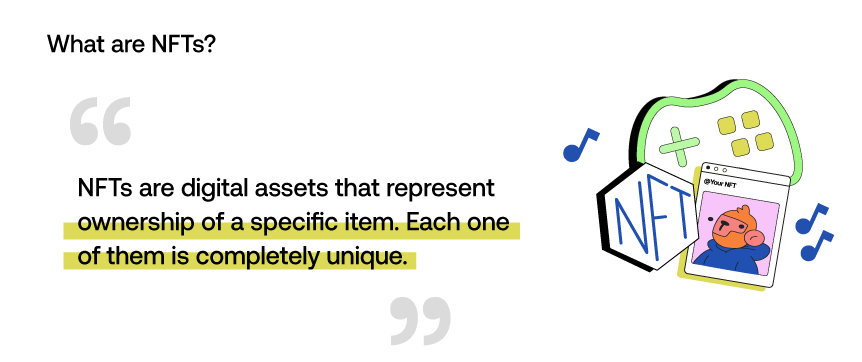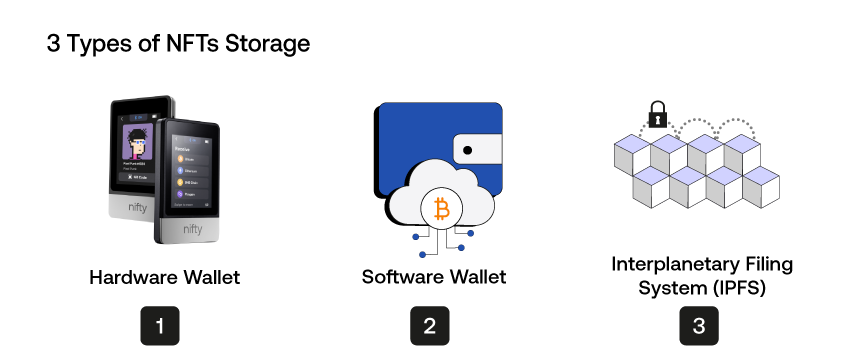
Disclaimer: The information provided in this article is for educational purposes only and should not be considered as financial advice.
Quick Crash Course to NFTs

NFTs are unique, digital assets that represent ownership of a specific item, artwork, or collectible on a blockchain network. They are completely unique and unlike cryptocurrencies like Bitcoin or Ethereum, NFTs cannot be exchanged on a 1:1 basis because of this.
They use smart contracts (automated digital contracts) to verify ownership and authenticity, making them an ideal channel for verifying digital assets including art, music, videos, and even virtual real estate (Decentraland). NFTs have gained a ton of popularity for their ability to revolutionize digital ownership.
There was a lot of speculation regarding the value of NFTs and whether or not they would last. The verdict is still undetermined and they are still dividing many in the web3 community. Knowing the info above, what do you think?
Common Ways to Store NFTs
There are a few ways to store NFTs. NFT wallets like our Nifty are few and far between compared to crypto wallets. Let’s break down the technology behind NFT storage and make sure your assets remain safe.

- Hardware Wallet
One of the safest ways for storing NFTs is via a hardware wallet. Hardware wallets are physical devices that are offline (not connected to the internet), which is also referred to as cold storage. A cold storage hardware wallet is much more successful at protecting against online hacks and threats. SecuX specializes in hardware wallets, which are equipped with the Infineon Solid Flash CC EAL5+ Secure Element (SE) chip for military-grade security.
- Software Wallet
We then have software wallets, which are often also referred to as a hot wallet (opposite to cold storage). Software wallets are digital wallets or online platforms such as browser extensions. They do not store your NFTs offline as hardware wallets do. They are admittedly less secure than offline cold wallets.
If security is an issue, and we know how important it is in the web3 space, why does anyone choose to use a hot crypto wallet? The answer is convenience. A software wallet is an excellent entryway to storing NFT assets for beginners due to its ease of use.
However, as we mentioned, security is a primary concern as software wallets are connected to the internet and can be vulnerable to hacking attempts. It’s essential to choose a reputable and secure software wallet to safeguard your NFT investments.
- Interplanetary Filing System (IPFS)
Lastly, we have the interplanetary file system or IPFS. No, it’s not some sort of sci-fi futuristic device. Instead, it’s a decentralized protocol. It works by spreading data across a computer network instead of relying on a single server. So, if the platform where you bought or stored your NFTs shuts down, your NFT’s information, like its image or description, can still be accessed through the IPFS.
This safeguards your NFT’s value and existence, making it a smart choice for those who want to insure their digital collectibles.
Which is the Best Way to Keep NFTs?
Out of the three, which is the best and safest way to store your NFT assets? If you ask us, it’s definitely using a cold wallet/hardware wallet. Because your digital assets are kept offline with cold storage wallets, it shields you from online threats.
Hardware wallets are like digital vaults for your NFTs, and they come equipped with robust security features. While hardware wallets may be less convenient for active NFT trading, they are an ideal choice for long-term storage. Just make sure you keep your private keys safe.
NFT Storage Tips
- Cold Storage
- Use Strong Passwords
- Back Up Your Wallet
- Enable Multi-Signature Authentication
- Diversify Your Storage
- Keep Firmware Updated
- Use Whitelists
- Beware of Public Wi-Fi
- Stay Informed About Scams
- Consider Insurance
Conclusion
Security is paramount within the dynamic world of NFTs. There is no one-size-fits-all option. For those who value convenience over security, an online software wallet is a great choice. However, those who treat their digital wallet as a vault would go for cold storage and the innovative Interplanetary Filing System (IPFS) can complement your storage strategy.
Related:
How to Mint an NFT – It’s Easier Than You Think
Can You Earn Passive Income Through Crypto and NFTs?
Multi-Signature Wallets – Are They Right for You?
Sources:
A Beginner’s Guide To Store NFT Assets Safely – Blockchain Council

0 comments